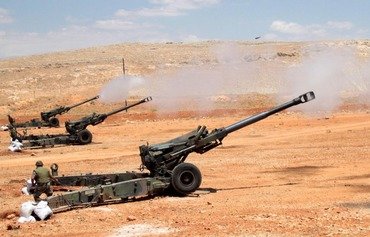Recent Lebanese army raids targeting "Islamic State of Iraq and Syria" (ISIS) infiltrators on the outskirts of Arsal are part of a pre-emptive strategy to tighten border security as the group flees from battlefronts in Syria, experts said.
The raids seek to prevent ISIS fighters fleeing al-Raqa and Deir Ezzor from crossing the border into Lebanon and linking up with extremists who have a presence in the rugged outlying areas of Arsal.
On April 22nd, a Lebanese army unit carried out a raid in Wadi al-Hosn after spotting a group of extremists infiltrating into the outskirts of Arsal.
The unit killed ISIS emir in al-Qalamoun Hassan al-Mleiss, and captured 10 other extremists -- four Lebanese and six Syrians.
"The unit came under fire from the terrorist elements, and returned fire in kind, killing the emir of the terrorist group in al-Qalamoun region," according to a statement by the Army Command's Directorate of Guidance.
No soldiers were injured during the raid, the statement said.
Al-Mleiss had taken part in the attack on Arsal in 2014, the statement said, storming Internal Security Forces headquarters and abducting soldiers.
Two days after the raid, on April 24th, army helicopters bombed ISIS positions in al-Mkhairime, Wadi al-Kaff and Qurnet al-Kahf, killing or wounding 20 fighters, the National News Agency reported.
Blocking ISIS infiltration
Army Commander Gen. Joseph Aoun said the recent operation in Arsal "proves once again that there is no safe haven for terrorists in any part of Lebanon".
"The eyes of the army are capable of detecting and responding to any terrorist movement or activity immediately," he said, adding that "any attempt to undermine security and stability will be met with a strong and firm response".
With the recent operations in Arsal, the army is sending a clear message that it intends to defend its borders and prevent outside infiltration, said Brig. Gen. Naji Malaeb, a security strategy specialist who is retired from the Lebanese military.
The army intends to close the remaining gaps between Ras Baalbek and Arsal in Lebanon and Syria's al-Qalamoun region, he told Al-Mashareq.
The timing of the recent raids is "important, because it coincides with the escalation of fighting around al-Raqa and ISIS’s smuggling of its leaders to Deir Ezzor, which is itself coming under airstrikes", he said.
Faced with the possibility that ISIS elements might attempt to infiltrate into Lebanon, he said, the army has been enhancing border security and intensifying its pre-emptive operations.
"The army is carrying out its duties on Lebanese territory at the border to ensure that Lebanon does not become a safe haven for terrorists," he added.
Pre-emptive operations
The recent operations come in the context of the "army’s continued pre-emptive operations against the terrorists", said Middle East Centre for Strategic Studies head Brig. Gen. Hisham Jaber, a retired Lebanese army officer.
These range from monitoring their movements to conducting raids against them, he told Al-Mashareq.
ISIS elements fleeing al-Raqa and Deir Ezzor have sought refuge in valleys and caves between al-Qalamoun and the Lebanese border near Baalbek and Arsal, he said, adding that the Lebanese army has been monitoring their movements.
The army has been apprehending groups of extremists who attempt to breach the border with raids, artillery fire and airstrikes, he added.
Gen. Aoun previously led an army unit stationed in Arsal, Jaber said, noting that the army chief "has a clear and sound vision on how to use the army's capabilities to confront the militants and prevent them from advancing, and is personally overseeing the successful execution of military plans".
"The Army Command is taking into account the outcomes of the battles of al-Raqa and Deir Ezzor and intensifying its pre-emptive counter-terrorism operations in order to block the path of thousands of fleeing militants," he said.
When al-Raqa falls, he said, these fighters will be prevented from approaching or crossing the Lebanese border to join the groups currently present in the rugged outskirts of Arsal.
The arrest of the 10 ISIS elements and army’s bombing raids and daily attacks on the group's positions all aim to block their advance and serve as a deterrent to sleeper cells and potential lone wolves attackers in Lebanon, Jaber said.
Extensive surveillance
The recent raids in Arsal were conducted after the Army Intelligence Directorate conducted an "extensive surveillance and monitoring operation", said Michel Nasr, a journalist who specialises in security affairs.
According to reliable security sources, he told Al-Mashareq, information obtained from multiple sources pointed to the presence of a group of wanted individuals between a camp in Wadi Ajram and al-Fleiti in Wadi al-Hosn.
Based on this information, the army devised a plan that divided the area into squares and tightened the cordon around the targeted locations, he said, before carrying out the raid.
Al-Mleiss had been looking into re-positioning the group’s fighters in the outskirts of Arsal, Nasr said.
This appeared to be in preparation for the post-al-Raqa-battle phase, when Lebanon would be used as an escape route for ISIS, he added.
The Lebanese army is in control of the situation in Arsal, however, he said, "and acting according to plans it has in place that are achieving successes".

![A Lebanese soldier stands guard beside a tank positioned near Arsal on the border with Syria. On April 22nd, an army raid in the area killed an 'Islamic State of Iraq and Syria' emir. [Photo courtesy of the Army Command's Directorate of Guidance]](/cnmi_am/images/2017/05/03/7786-Lebanon-Arsal-army-600_384.jpg)






